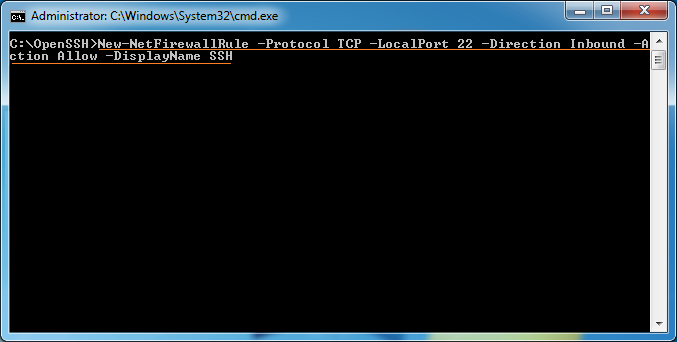
#Openssh windows server 2012 keygen

In logs, it shows debug1: AUthentications that can continue :publickey,gssapi-keyex,gssapi-with-mic,keyboard-interactiveĭebug1: Next Authentication method : publickkeyĭebug1:Trying private key:d:/apps/keys/prvikeyĭebug1: AUthentications that can continue :publickey,gssapi-keyex,gssapi-with-mic,keyboard-interactiveĭebug1: Next Authentication method : keyboard-interactiveĭebug1: read_passphrase:can't open /dev/tty:No such file or directoryĪfter that if i go and end task scheduler process and kill any cmd.exe waiting for scp.exe PID and run again it works sometimes and failes sometimes. So when task runs it succesfully connects and works fine but sometimes its getting stuck without any error and task scheduler stuck i nrunning state. For that converted a private key of winscp to openSSH key using putty key gen and set permission of private key file read access only for SYSTEM user and changed file owner too. Just delete or comment out those two lines.I have created a openSSH SCP bat script and scheduled task to run as SYSTEM. This is the reason I searched for the same issue in midnight and came across your question. Will not match and the authorized_keys of administrative users willĬontinue to be in their respective userprofile paths - what a mess! In any other locale the translated name of the S-1-5-32-544 group On Windows Server 2019 or Windows 10.1809. Statement only ever matches as intended on english Windows installs, Select the OpenSSH installation method below that aligns with your server setup. The entry in the default sshd_config reads: Match Group administrators - but that is a localized group name that only applies network devices over a windows jumpbox (Windows server 2012 R2 standard). As the Administrator, run: icacls C:\users\username\.ssh /grant 'NT. If you have a working implementation of jumpssh over a windows server jumpbox. Grant the SSH server read permissions to the. Use the command below as Explore does not like the folder name. It introduces a localization issue and even more unexpected behavior. ssh folder (for the authorizedkeys file) in your Windows account profile folder (typically in C:\Users\username\.ssh). The biggest one is that it breaks the pubkey authentication in non-English environment. ONLY SSH server that is CERTIFIED for Windows 2012/2008R2/8/Vista Runs in Windows 2019/2016/2012R2/2012 server and. I made sure to have the public key on the instance in the ssh folder of the user and tried to SSH in from an instance with the private key. I was struggling with setting up public key authentication via SSH on a Windows Server 2012 R2 instance.

The author of the commit thinks this is a privilege escalation.Īccording to the discussion in that thread, this change didn't actually solve any concern, but rather introduced a bunch of new issues. You need to provide your account the following privilege 'Replace a process level token' secpol.msc LocalPolicies -> User Rights Assignment Click the policy that says 'Replace a process level token' and add your account. SSH Config Commenting Out Match Group Administrators. And then ssh localhost to get a elevated session inside a non-elevated one, which could bypass the UAC. This is said to prevent an admin login in a non-elevated session, generate a key pair and append the pubkey to authorized_keys in his home path. If the server-side public key can't be validated against the client-side private key, authentication fails. If this rule is not available, manually create it: Replace C:\Windows\System32\OpenSSH\sshd.exe with the actual path to the sshd. Make sure your Windows Defender Firewall is open for port 22, rule OpenSSH-Server-In-TCP must be enabled. Key based authentication enables the SSH server and client to compare the public key for a user name provided against the private key. Start the OpenSSH Authentication Agent and SSH Server services: &sc.exe start sshd, &sc.exe start ssh-agent. These two lines redirect the authorized_keys to a path that requires elevated session to make change while you are logging in with a admin account. The public key is what is placed on the SSH server, and may be shared without compromising the private key. Is administrators_authorized_keys a security problem? Override default location for authorized_keys for administrators by manojampalam Īnd here is the tread discussing this change:


 0 kommentar(er)
0 kommentar(er)
